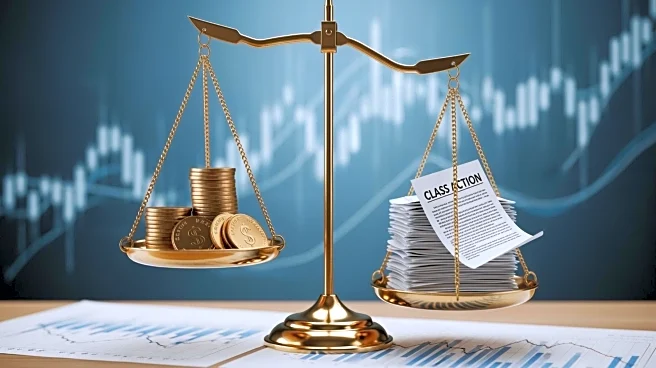What's Happening?
Robbins Geller Rudman & Dowd LLP has announced a class action lawsuit against Dow Inc. for securities fraud. The lawsuit, filed in the Eastern District of Michigan, alleges that Dow and its executives
made false or misleading statements regarding the company's ability to mitigate macroeconomic and tariff-related challenges. The lawsuit claims that Dow overstated its financial flexibility and understated the negative impacts of competitive pressures and global sales softening. Dow reported a significant second-quarter loss in 2025, leading to a stock price drop and a dividend cut. Investors who purchased Dow securities between January 30, 2025, and July 23, 2025, have until October 28, 2025, to seek appointment as lead plaintiff.
Why It's Important?
The lawsuit highlights the challenges faced by Dow Inc. in navigating a difficult economic environment marked by trade uncertainties and competitive pressures. The financial losses and subsequent legal action could impact Dow's reputation and investor confidence. The case underscores the importance of transparency and accurate reporting in corporate governance. If successful, the lawsuit could lead to significant financial recovery for affected investors and set a precedent for similar cases in the industry. The outcome may influence how companies communicate financial risks and manage shareholder expectations.
What's Next?
Investors have the opportunity to become lead plaintiffs in the class action lawsuit, which could influence the direction and outcome of the case. The legal proceedings will likely involve detailed examination of Dow's financial disclosures and business practices. The case may prompt Dow to reassess its strategies for managing economic challenges and communicating with shareholders. Other companies in the industry may also review their practices to avoid similar legal issues. The lawsuit's progress will be closely watched by investors, legal experts, and industry analysts.
Beyond the Headlines
The lawsuit raises broader questions about corporate accountability and the role of shareholder litigation in enforcing transparency. It highlights the potential consequences of economic volatility on corporate performance and investor relations. The case may lead to discussions on the ethical responsibilities of corporations in managing financial risks and protecting shareholder interests. It also reflects the growing importance of legal mechanisms in addressing corporate misconduct and ensuring fair treatment of investors.










